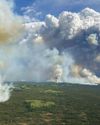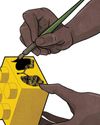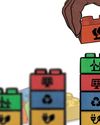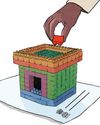
Sasthragathy
കേരളത്തിലെ എൻട്രൻസ് പരീക്ഷ പരിശോധനയ്ക്ക് വിധേയമാക്കുമ്പോൾ
പ്രൊഫഷണൽ വിദ്യാഭ്യാസം ഡാറ്റാ പരിവർത്തനത്തിലൂടെ വിശകലനം നടത്തേണ്ട സാഹചര്യത്തെക്കുറിച്ച് വിശദീകരിക്കുന്നു. കേരളത്തിൽ വ്യത്യസ്ത സിലബസ്സിൽ പഠിക്കുന്ന കുട്ടികൾക്ക് എൻട്രൻസ് പരീക്ഷയിൽ ലഭിക്കുന്ന സ്കോറിന്റെ ഏറ്റക്കുറച്ചിലു കൾക്കുള്ള കാരണം വിശദീകരിക്കുന്നു. ഗ്ലോബൽ ശരാശരിയും സ്റ്റാൻഡേർഡ് ഡീവിയേ ഷനും എന്താണെന്നും അവ കണക്കാക്കുന്ന തെങ്ങനെയെന്നും വ്യക്തമാക്കുന്നു.
5 min |
August 2024

Down To Earth
NATURE'S MAPPERS
Reptiles show an ability fo understand and remember spaces, which makes them a natural insect pest controller
3 min |
July 01, 2024

Down To Earth
Pathogen benefit-sharing pact thwarted again
Deep political rifts at WHO leave a critical pandemic treaty hanging in limbo as rich nations baulk at equitable vaccine sharing
4 min |
July 01, 2024

Down To Earth
LOCAL SOLUTIONS
The solution to Sangam Vihar's water supply, sanitation and stormwater problems could lie in decentralised management, suggests a Centre for Science and Environment survey in the unplanned settlement
9 min |
July 01, 2024

Down To Earth
Insured against heat
States and private firms are implementing insurance schemes fo protect livestock rearers against milk production losses caused by heat stress
5 min |
July 01, 2024

Down To Earth
BRACE FOR STILL WINDS
Wind circulations are slowing down across the globe. It may not be immediately apparent in terms of wind speed, which is a local phenomenon. But scientists say global stilling of wind affects almost every aspect of our lives—from unpredictable rainfall to excess heatwaves to frequent or missing storms. It even affects wind energy production and the aviation sector. Evidence shows a clear connection between global warming and wind stilling. Could this be the missing piece in climate models?
5 min |
July 01, 2024

Down To Earth
THE NEW EXTREME EVENT
Wind circulations are slowing in a warming world, adding to the frequency and intensity of extreme events
10+ min |
July 01, 2024

Down To Earth
Ground rules
Space agencies and private players must adhere to exploration norms to ensure integrity of space research
8 min |
July 01, 2024

Down To Earth
CATCHING THE WIND
Wind is the missing piece of the climate change puzzle. But lack of data makes it difficult to model wind systems
6 min |
July 01, 2024

Down To Earth
Business of dirt
The waste management ecosystem is rooted in poverty, politics, colonialism, corporate greed and environmental injustice, with serious consequences to human health
3 min |
July 01, 2024

Down To Earth
The Next Pandemic
Buoyed by climate change and global trade, pathogens that cause disease outbreaks in food crops are spreading far and wide. They are also evolving fast to reproduce quickly and infect new hosts
10+ min |
June 16, 2024

Down To Earth
India capitulates on key accord at WIPO
The WIPO treaty on genetic resources is historic, but it will override vital safeguards in India's law to prevent bad patents
4 min |
June 16, 2024

Down To Earth
POWER OF PAAN
Betel leaves are not just an integral part of India's culture, but also hold many benefits. Add them to your list of healthy greens
4 min |
June 16, 2024

Down To Earth
A local national verdict
Issues of unemployment, price rise and agrarian distress seem to have shifted voter sentiment in the recent general elections
4 min |
June 16, 2024

Down To Earth
Native nutrition
THE LUNCH menu at the Rani Kajal Jeevan Shala School in Kakrana village of Madhya Pradesh shows a healthy mix of pulses, vegetables and millets.
2 min |
June 16, 2024

Down To Earth
Wild guess
Despite being a significant source of greenhouse gases, wildfire emissions remain underestimated
7 min |
June 16, 2024

Down To Earth
'Fitness our evolutionary advantage, not longevity'
Nobel laureate VENKI RAMAKRISHNAN's latest book, Why We Die, covers a journey that starts in the 1800s, when British biologists Charles Darwin and Alfred Wallace proposed natural selection, and continues to this day, as researchers investigate anti-ageing compounds. But how close are we really to cheating ageing and death? In an interview with ROHINI KRISHNAMURTHY, Ramakrishnan, who received the 2009 Nobel prize in chemistry, says the focus of research is on staying healthy for a bigger fraction of life. He also examines the causes of ageing, the drugs being explored to slow down this deterioration, the people involved in the research and a few controversial claims. Excerpts:
7 min |
June 16, 2024

Down To Earth
Look Beyond Dust
Reinvent National Clean Air Programme to focus on fine particulate matter and trans-boundary pollution
5 min |
June 01, 2024

Down To Earth
Vision 2030
Economic growth must take into account needs of energy transition, climate mitigation, with action aligned as per India's 2030 climate goals
5 min |
June 01, 2024

Down To Earth
FIX OUR FOOD
Chemical-dependent farming, lax labelling laws, rising anti-microbial resistance must top the agenda
5 min |
June 01, 2024

Down To Earth
PLAN THEM COOL
As urban India turns into a heat trap, the government must focus on improving cities' liveability
5 min |
June 01, 2024

Down To Earth
THINK LONG-TERM
India needs continued emphasis on flagship programmes, aligned to long-term planning that focusses on water security and circular economy in a climate-risked era
8 min |
June 01, 2024

Down To Earth
IT'S NOW OR NEVER
Clean energy sectors need demand-driven markets and domestic industries that can cater to the entire value chain
5 min |
June 01, 2024

Down To Earth
BATTLE THE CAR BULGE
Clean, affordable, integrated and accessible public transport the only solution
3 min |
June 01, 2024

Down To Earth
SCRAP THE DUMP
Disincentivise garbage dumping, invest in behavioural change
4 min |
June 01, 2024

Down To Earth
CONSERVE NOW
Disregard for biodiversity conservation over the past two decades needs immediate redressal
3 min |
June 01, 2024

Down To Earth
OLD AGENDA WITH NEW IMAGINATION
The new government must rebuild trust by being tolerant to ideas, opinions and information.
4 min |
June 01, 2024

Down To Earth
OVERHAUL OVERDUE
Hold polluting industries accountable for public health risks, environmental hazards, climate change; provide them support for green transition
7 min |
June 01, 2024

Down To Earth
THE AL'CHEMY OF EMOTIONS-L'UST
Love, lust, attachments are basic brain circuits. They are too primitive a system and will never change
10+ min |
May 16, 2024

Down To Earth
THE AL'CHEMY OF EMOTIONS - GREED
Evolutionary biology sees greed as a way to increase your chances of survival
10+ min |
